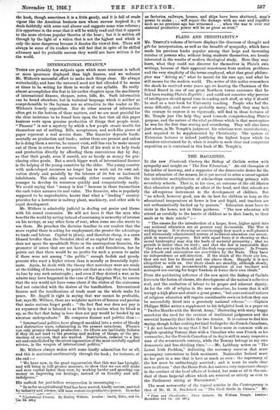INTERNATIONAL FINANCE.*
THERE are probably few subjects upon which more nonsense is talked or more ignorance displayed than high finance, and we welcome Mr. Withers's successful effort to make such things clear. He always writeslucidly, and here the unversed need not feel offended if he seems at times to be writing for them in worsts of one syllable. He really almost accomplishes this feat in his earlier chapters upon the machinery,
of international finance, cheques, notes, bills, Suoh information can be found elsewhere, but in technical language which is neither so comprehensible to the layman nor so attractive to the reader as Mr. Withers's homely exposition. Nor do other sources of information often get to the bottom of these matters, and we are most grateful for the clear insistence to be found here upon the fact that all this paper business rests upon genuine production of things that people want. " rmance " is not a mystery by which a few people create wealth for themselves out of nothing. Bills, acceptances, and such-like pieces of paper represent a real service done. The financier depends funda- mentally on production and trade ; unless these are present and unless he is doing them a service, he cannot exist, still less can he make money out of them in return for services. Part of his work is to help trade and production directly by affording them convenience day by day, so that their goods, even if unsold, are as handy as money for pur- chasing other goods. But a much bigger work of international finance is the helping of the young countries by the older. The young country with undeveloped resources no longer has to work out its own sal- vation slowly and painfully by the labours of it few or backward inhabitants. The older and outwardly richer country enables the younger to develop its resources quickly and comparatively easily. We avoid saying that "money is lent" because in these transactions the cash token assumes its real value. The financier, who is popularly supposed to be unproductive, knows that what a " lending " country provides for a borrower is railway plant, machinery, and other aids to rapid development.
Mr. Withers is admirably judicial in dealing out praise and blame with his sound economies. He will not have it that the man who benefits the world by saving instead of consuming is unworthy of interest on his savings, or any other form of rent, when some one else wants to use them. He preaches the doctrine familiar to our readers that the more capital there is asking for employment, the greater the advantage to trade and labour. Capital in plenty, and therefore cheap, is a more blessed leveller than the Socialist ideal of no capital for any one. He does not spare the spendthrift State or the unscrupulous financier, the promoter of issues that are not based on a solid foundation, but he points out that there would be no profits for such a person to make if there were not among "the public" enough foolish and greedy persons who want a higher return than is morally or financially legiti- mate. Again, he deals with the theory that nowadays wars are made at the bidding of financiers ; he points out that as a rule they are bound to lose by any such catastrophe ; and even if they desired a war, as he admits may have happened in the case of the Egyptian War, he asserts that the war would not have come about if the wishes of the statesmen had not coincided with the desires of the bondholders. International finance and the ramifications of trade must on the whole make for peace. Mr. Angell is right in saying that war cannot be profitable, but, says Mr. Withers, there are weightier matters of honour and passion that make nations forget profit: "the fact that war does not pay is an argument that is listened to as little by a nation when its blood is up, as the -fact that being in love does not pay would be heeded by an amorous undergraduate." He compares finance and politics thus :—
" International politics have plunged mankind into a series of bloody and destructive wars, culminating in the present cataclysm. Finance can only prosper through production ; its efforts are inevitably failures if they do not tend to the growing and making of things, or the pro- duction of services, that aro wanted. Destruction, reduced to a fine art and embellished by the nicest ingeautities of the most carefully applied science, is the weapon of international politics."
Mr. Withers always writes with some kindly admonition for us all, and this is scattered unobtrusively through the book ; for instance, at the end:— " We have now, in the great regeneration that this war has brought, and will brie* in still greater measure, to show that we can still make and save capital faster than ever, by working harder and spending our money on improving our heritage, instead of on frivolity and self- indulgence."
His outlook for post-helium recuperation is encouraging :— " In so far as agricultural Ind has been wasted, kindly nature, assisted by industry and s.cienotecalll soon restore its productive power. In so far
• ffrialional Finance. By Hartley Withers. London : Smith, Elder, and Co. 1:sr. U. net.)
as factories, railways, houses, and ships have been shattered, man's power to make . . . will repair the damage with an ease and rapidity such as no previous age has witnessed . . . when the war is over our material productive power will be as great as ever."


































 Previous page
Previous page